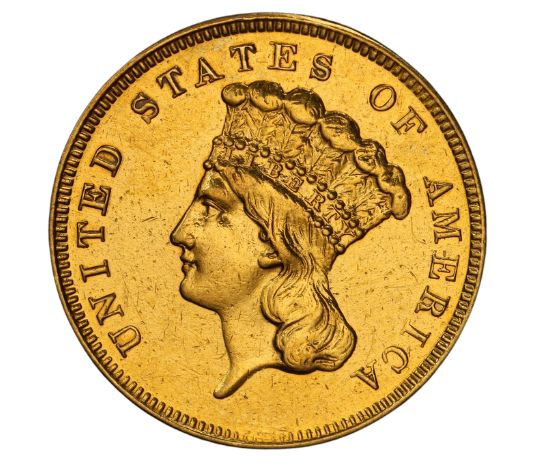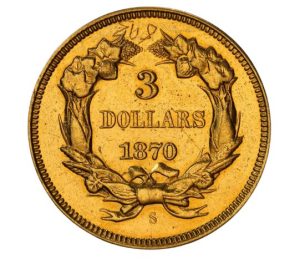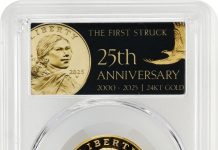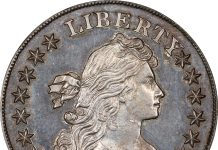
The 1870-S $3, PCGS SP50 is the Professional Grading Service’s (PCGS) Coin of the Month.
There are few coins as enigmatic and storied as the 1870-S $3, a special-strike coin that has gone down in history as one of the rarest and most historic coins in American numismatics. The story behind this elusive gold coin leads to more questions than answers, but what numismatic researchers understand is one example was included in a time capsule buried within the cornerstone of the San Francisco Mint. Another, which is the only example realistically obtainable to collectors, is the specimen we discuss here.

The United States coinage of 1870 carries a certain allure because of the rarities connected to that date. Much like the coinage of 1804, the famous date borne upon the magnificent 1804 Draped Bust silver dollar, an ultra-rarity itself produced in the mid-1830s for inclusion in special proof sets issued as diplomatic gifts, the coins of 1870 pique collector interest. Notably, the United States Mint Director report from 1870 does not note the official production of any $3 gold coins that year. Yet, at least one, if not two, certainly exist. Theories abound as to how and why this (perhaps “duplicate”) specimen exists. But we’ve neither the time nor space here to delve into the volumes of work orbiting these theories.
The facts remain, this 1870-S $3 gold coin boasts one of the most sensational lineages of numismatic pedigree around, having resided in the cabinets of William H. Woodin, Waldo C. Newcomer, Louis Eliasberg, and Harry Bass. The 1870-S $3 gold coin was graded by Professional Coin Grading Service as Specimen-50 “893 Engraved” prior to selling in a Heritage Auctions event for an astounding $5,520,000 in January 2023.
About Coin Grading
Grade refers to a coin’s level of preservation: how many nicks or scratches or other imperfections it has. Coins are graded on a scale of one to 70, with higher numbers signifying higher grades. One represents a coin that is so well worn that it’s barely identifiable as to its type. 70 represents a perfect coin: a coin that when viewed under a five-power magnifying glass has no visible imperfections.
60 through 70 represent the Mint State (MS) grades. A coin graded MS-60 can have so many nicks and scratches and flaws that it might look as if Godzilla used it as a teething ring. MS-65 is the industry standard for “Gem.” MS-66 through MS-69 are the near-flawless super-grade or wonder coin assignations. With each grade level above MS-66, the value might double or triple.
Grade names are used in addition to numerical grades. In ascending order, these word grades are About or Almost Good; Good; Very Good; Fine; Very Fine; Extra or Extremely Fine; About or Almost Uncirculated; and Mint State.
A Proof is not a special Mint State coin. Proof refers to a method of manufacture, not a grade. Although Proof coins are struck using specially polished dies and specially selected planchets (metal discs) to ensure a chromium-like brilliance, they can circulate or be spent. Proofs are also graded on the one through 70 scale. A Proof coin grading less than Proof-60 is referred to as an “impaired Proof.”
To subscribe to COINage magazine click here.
















